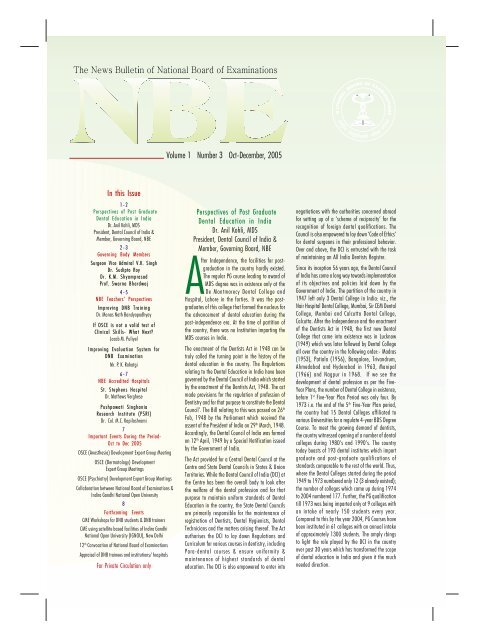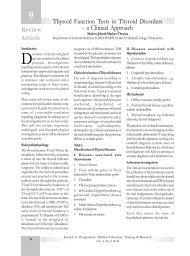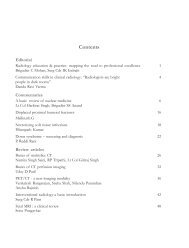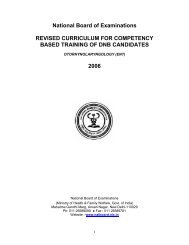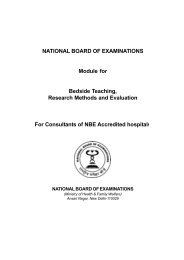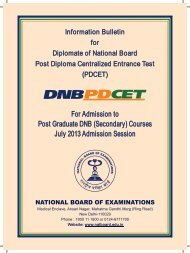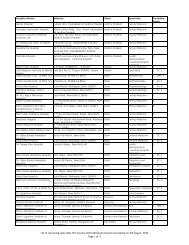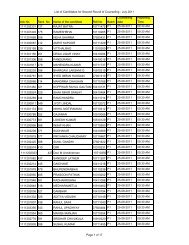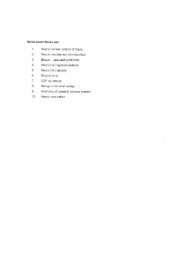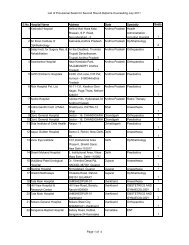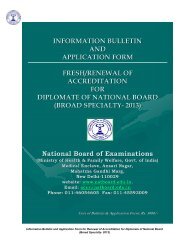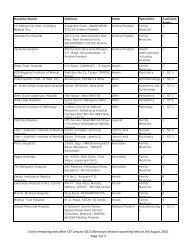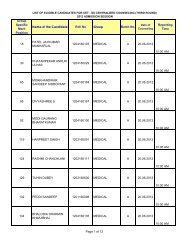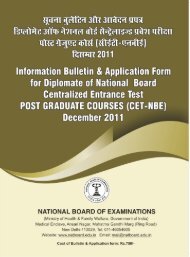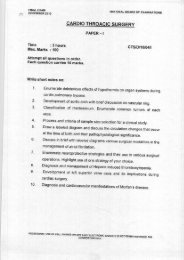NBE Bulletin Pgs Dec 3 - National Board Of Examination
NBE Bulletin Pgs Dec 3 - National Board Of Examination
NBE Bulletin Pgs Dec 3 - National Board Of Examination
Create successful ePaper yourself
Turn your PDF publications into a flip-book with our unique Google optimized e-Paper software.
Volume 1 Number 3 Oct-<strong>Dec</strong>ember, 2005<br />
In this Issue<br />
1-2<br />
Perspectives of Post Graduate<br />
Dental Education in India<br />
Dr. Anil Kohli, MDS<br />
President, Dental Council of India &<br />
Member, Governing <strong>Board</strong>, <strong>NBE</strong><br />
2-3<br />
Governing Body Members<br />
Surgeon Vice Admiral V.K. Singh<br />
Dr. Sudipto Roy<br />
Dr. K.M. Shyamprasad<br />
Prof. Swarna Bhardwaj<br />
4-5<br />
<strong>NBE</strong> Teachers’ Perspectives<br />
Improving DNB Training<br />
Dr. Manas Nath Bandyopadhyay<br />
If OSCE is not a valid test of<br />
Clinical Skills- What Next<br />
Jacob M. Puliyel<br />
Improving Evaluation System for<br />
DNB <strong>Examination</strong><br />
Mr. P. K. Rohatgi<br />
6-7<br />
<strong>NBE</strong> Accredited Hospitals<br />
St. Stephens Hospital<br />
Dr. Mathews Verghese<br />
Pushpawati Singhania<br />
Research Institute (PSRI)<br />
Dr. Col. M.C. Kapilashrami<br />
7<br />
Important Events During the Period-<br />
Oct to <strong>Dec</strong> 2005<br />
OSCE (Anesthesia) Development Expert Group Meeting<br />
OSCE (Dermatology) Development<br />
Expert Group Meetings<br />
OSCE (Psychiatry) Development Expert Group Meetings<br />
Collaboration between <strong>National</strong> <strong>Board</strong> of <strong>Examination</strong>s &<br />
Indira Gandhi <strong>National</strong> Open University<br />
8<br />
Forthcoming Events<br />
CME Workshops for DNB students & DNB trainers<br />
CME using satellite based facilities of Indira Gandhi<br />
<strong>National</strong> Open University (IGNOU), New Delhi<br />
12 th Convocation of <strong>National</strong> <strong>Board</strong> of <strong>Examination</strong>s<br />
Appraisal of DNB trainees and institutions/ hospitals<br />
For Private Circulation only<br />
Perspectives of Post Graduate<br />
Dental Education in India<br />
Dr. Anil Kohli, MDS<br />
President, Dental Council of India &<br />
Member, Governing <strong>Board</strong>, <strong>NBE</strong><br />
After Independence, the facilities for postgraduation<br />
in the country hardly existed.<br />
The regular PG course leading to award of<br />
MDS degree was in existence only at the<br />
De Montmorecy Dental College and<br />
Hospital, Lahore in the forties. It was the postgraduates<br />
of this college that formed the nucleus for<br />
the advancement of dental education during the<br />
post-independence era. At the time of partition of<br />
the country, there was no Institution imparting the<br />
MDS courses in India.<br />
The enactment of the Dentists Act in 1948 can be<br />
truly called the turning point in the history of the<br />
dental education in the country. The Regulations<br />
relating to the Dental Education in India have been<br />
governed by the Dental Council of India which started<br />
by the enactment of the Dentists Act, 1948. The act<br />
made provisions for the regulation of profession of<br />
Dentistry and for that purpose to constitute the Dental<br />
Council’. The Bill relating to this was passed on 26 th<br />
Feb, 1948 by the Parliament which received the<br />
assent of the President of India on 29 th March, 1948.<br />
Accordingly, the Dental Council of India was formed<br />
on 12 th April, 1949 by a Special Notification issued<br />
by the Government of India.<br />
The Act provided for a Central Dental Council at the<br />
Centre and State Dental Councils in States & Union<br />
Territories. While the Dental Council of India (DCI) at<br />
the Centre has been the overall body to look after<br />
the welfare of the dental profession and for that<br />
purpose to maintain uniform standards of Dental<br />
Education in the country, the State Dental Councils<br />
are primarily responsible for the maintenance of<br />
registration of Dentists, Dental Hygienists, Dental<br />
Technicians and the matters arising thereof. The Act<br />
authorises the DCI to lay down Regulations and<br />
Curriculum for various courses in dentistry, including<br />
Para-dental courses & ensure uniformity &<br />
maintenance of highest standards of dental<br />
education. The DCI is also empowered to enter into<br />
negotiations with the authorities concerned abroad<br />
for setting up of a ‘scheme of reciprocity’ for the<br />
recognition of foreign dental qualifications. The<br />
Council is also empowered to lay down ‘Code of Ethics’<br />
for dental surgeons in their professional behavior.<br />
Over and above, the DCI is entrusted with the task<br />
of maintaining an All India Dentists Register.<br />
Since its inception 56 years ago, the Dental Council<br />
of India has come a long way towards implementation<br />
of its objectives and policies laid down by the<br />
Government of India. The partition of the country in<br />
1947 left only 3 Dental College in India: viz., the<br />
Nair Hospital Dental College, Mumbai, Sir CEM Dental<br />
College, Mumbai and Calcutta Dental College,<br />
Calcutta. After the Independence and the enactment<br />
of the Dentists Act in 1948, the first new Dental<br />
College that came into existence was in Lucknow<br />
(1949) which was later followed by Dental College<br />
all over the country in the following order:- Madras<br />
(1953), Patiala (1956), Bangalore, Trivandrum,<br />
Ahmedabad and Hyderabad in 1963, Manipal<br />
(1966) and Nagpur in 1968. If we see the<br />
development of dental profession as per the Five-<br />
Year Plans, the number of Dental College in existence,<br />
before 1 st Five-Year Plan Period was only four. By<br />
1973 i.e. the end of the 5 th Five-Year Plan period,<br />
the country had 15 Dental Colleges affiliated to<br />
various Universities for a regulate 4-year BDS Degree<br />
Course. To meet the growing demand of dentists,<br />
the country witnessed opening of a number of dental<br />
colleges during 1980’s and 1990’s. The country<br />
today boasts of 193 dental institutes which impart<br />
graduate and post-graduate qualifications of<br />
standards comparable to the rest of the world. Thus,<br />
where the Dental Colleges started during the period<br />
1949 to 1973 numbered only 12 (3 already existed);<br />
the number of colleges which came up during 1974<br />
to 2004 numbered 177. Further, the PG qualification<br />
till 1973 was being imparted only at 9 colleges with<br />
an intake of nearly 150 students every year.<br />
Compared to this by the year 2004, PG Courses have<br />
been instituted in 61 colleges with an annual intake<br />
of approximately 1300 students. The amply rbings<br />
to light the role played by the DCI in the country<br />
over past 30 years which has transformed the scope<br />
of dental education in India and given it the much<br />
needed direction.
<strong>NBE</strong>’s Governing Body Members<br />
2<br />
Though the measures adopted by the DCI effectively<br />
increased the number of graduate Dental Surgeons<br />
over past 56 years, proportionate increase has not<br />
taken place towards the Post Graduate qualification.<br />
The recommendations of the Bhore Committee in<br />
1950’s and the other subsequent committees over<br />
past many years have recommended increasing the<br />
number of PG qualified doctors in the country. Towards<br />
this, till now the Dental Profession had only one<br />
avenue for higher studies i.e. the MDS Degree Course.<br />
To meet this growing demand as well as to ensure<br />
higher competence in the specialty and with the<br />
Primary aim to prepare for a career in teaching,<br />
research and specialty practice, the <strong>National</strong> <strong>Board</strong><br />
of <strong>Examination</strong>s (<strong>NBE</strong>) has accented its permission to<br />
conduct DNB Courses in India for graduate Dental<br />
surgeons. This can truly be hailed as heralding a<br />
new era towards the Post Graduate Qualifications.<br />
Opening of these new vistas towards imparting Post<br />
Graduate Qualifications is indeed laudable and will<br />
serve a dual purpose of increasing the PG seats<br />
across the country as well as provide an alternate<br />
recognized PG course. The Dental Council of India on<br />
its part will be giving a thrust towards this direction<br />
by introducing structured programmes for each<br />
specialty. The eligibility and criteria for selection,<br />
syllabus, training, programme and the accreditation<br />
criteria laid down by the <strong>NBE</strong> shall be adhered to. It<br />
is proposed to initially start the DNB courses in select<br />
few teaching institutions in the country in chosen<br />
specialties with a view to test and structure this<br />
module of PG qualification to suit the environ specific<br />
to country. In the coming years, the DCI shall be<br />
laying its main thrust towards this direction to make<br />
this module a success.<br />
Furture Perspectives<br />
The DCI over a period of next few years shall be<br />
adopting measures and strategies to improve the<br />
quality of dental education in the Dental Institutions<br />
not only to improve the quality of dentists in the<br />
country but also to attract foreign students which<br />
can prove to be a major source of foreign exchange<br />
for the country. Towards this, a beginning has<br />
already been made by making the ‘teaching faculty’<br />
in each Institution fully accountable towards their<br />
primary role. Further, the need to have ongoing<br />
‘Continuing Dental Education’ programmes has been<br />
stressed for improving the standards of teaching in<br />
all the Institutions in the country. Learning is a life<br />
long endeavor, especially in a world that is changing<br />
as quickly as ours. Those of us, who have been in the<br />
profession of dentistry for may years, can attest to<br />
this need for ‘staying current’ with professional<br />
advancements in the rest of the world as well as to<br />
the present day’s legal requirement. This is especially<br />
true in view of India emerging as the most favored<br />
destination across the world for providing the most<br />
affordable and best possible dental treatment. The<br />
number of foreigners seeking specialist treatment in<br />
India in near future is likely to increase manifold<br />
which will need certain checks and balances to be<br />
introduced to safeguard the interest of dental<br />
profession in the country as well as to ensure quality<br />
treatment to the foreign visitors.<br />
The policy of awarding ‘credit hours’ by the reputed<br />
universities in India and abroad is being explored<br />
to make the Continuing Dental Education<br />
Programmes informative and competitive. Further<br />
the policy towards ‘Dental Education Accreditation’<br />
need to be reviewed by a group comprising of the<br />
members of the discipline of dentistry, education<br />
community, employers, practitioners, the State Dental<br />
Councils and the eminent public members. This will<br />
have to be modified to suit prevailing scenario with<br />
a view to govern the dental education for the next<br />
20 years. These standards of education shall not<br />
only be made applicable for Graduate and Post<br />
Graduate Dental Courses, advance Education<br />
Programmes, Continuing Dental Education<br />
Programmes, clinical Fellowship Training Programmes<br />
as well as all other Dental Education Programmes<br />
being conducted or proposed to be conducted relating<br />
to the field of Dentistry in India.<br />
Dentistry is a dynamic and rewarding profession<br />
which needs to be structured and groomed to be<br />
packed of opportunities and options so as to make it<br />
into one of the best careers in the country. Towards<br />
this, the Dental Council of India shall strive to<br />
continuously achieve higher goals with the<br />
participation of the Dental Fraternity and the<br />
Members of the Council for the years to come.<br />
Surgeon Vice Admiral<br />
V.K. Singh, PVSM, AVSM,<br />
VSM, PHS, DGAFMS & Sr.<br />
Col. Commandant<br />
Surgeon Vice Admiral V.K. Singh, PVSM, AVSM, VSM,<br />
PHS has taken over the helm of the Armed Forces<br />
Medical Services on 01 May 2005 as Director General. He<br />
started service as a medical professional from Allahabad<br />
University where he passed his MBBS in 1966 with four<br />
gold medals. He joined the Indian Navy in 1967 and<br />
gained immense first hand knowledge of life and conditions<br />
onboard Indian Naval Ships and establishments. He<br />
saved the life of a British <strong>Of</strong>ficer at high sea and was<br />
awarded Chief of Naval Staff Commendation in 1971.<br />
He specialized in Otolaryngology from University of Pune<br />
and was awarded gold medals both for DLO and MS<br />
(ENT) in 1974 and 1975, respectively. He has been<br />
trained in Microsurgery Ear and Larynx in India and<br />
abroad. He has been instrumental in setting up modern<br />
ENT facilities at Vishakhapatnam and Mumbai during<br />
the period 1976 to 1992, where state of the art<br />
contemporary Otolaryngology services are offered to all<br />
including needy civilians. The Admiral is a keen researcher<br />
and has many original research papers to his credit<br />
especially in the field of diving and underwater medicine.<br />
He modernized and upgraded the ENT department at<br />
Command Hospital Eastern Command, Kolkata where he<br />
served as Senior Adviser for the entire Eastern Sector from<br />
1992 to 1995.<br />
He was appointed Professor and acting Dean of the<br />
AFMC, Pune from 1995 to 1999 and was instrumental<br />
in initiating the Cochlear Implant Programme in the<br />
Armed Forces at AFMC, Pune in 1995. He performed the<br />
first Cochlear Implant Surgery in the Armed Forces in<br />
1995 and was also credited with the first paediatric<br />
Cochlear Implant Surgery in 1996. His zeal, dedication<br />
and desire for excellence has kept the Cochlear Implant<br />
Programme in the Armed Forces a viable entity. He is a<br />
visiting Professor at the Cochlear Implant Centre,<br />
Melbourne, Australia. He established the Cochlear Implant<br />
Centre at AFMC, Pune in 1995 and at INHS Asvini in<br />
1999. Under his stewardship, fifty three Cochlear Implant<br />
Surgeries have been conducted at AFMC, Pune and<br />
INHS Asvini, Mumbai. He is very keen and accomplished<br />
teacher and examiner at Mumbai, Pune, MUHS, Agra,<br />
Allahabad and Delhi Universities and has trained a<br />
generation of ENT Surgeons to whom he has passed on<br />
his clinical and surgical principles. He has published 95<br />
Scientific papers in various <strong>National</strong>/ International<br />
Journals. Number of Research Projects in the field of<br />
Underwater medicine, Neuro-otology & ENT have been<br />
successfully completed and submitted by himself for better<br />
Medicare of Armed Forces Personnel and their families on<br />
land, at sea, underwater and in the air. During his<br />
tenure as Commanding <strong>Of</strong>ficer, Medical Director and<br />
Dean of INHS Asvini, he has planned, modernized and<br />
equipped the hospital at large and the Department of<br />
ENT to function as state of the art centres of excellence in<br />
Medicare. The ENT department today is equipped with<br />
the latest equipment and facilities for Cochlear Implant<br />
Surgery, Microlaryngeal Surgery, Micro ear Surgery,<br />
Laser surgery, functional endoscopic sinus surgery and<br />
Head and Neck surgery. These equipments include the<br />
latest operating Microscope and a complete Neuro<br />
Otological laboratory facility. These comprehensive services<br />
are available to serving personnel and their dependents,<br />
ex-servicemen and needy civilians. His services have been<br />
recognized by the Cochlear Implant Centre Melbourne,<br />
Australia and he is a visiting Professor to the Bionic Ear<br />
Institute, Australia. At present, he is consultant to the<br />
Armed Forces Medical Services for the Cochlear Implant<br />
programme as well as Regional Advisor to Cochlear<br />
Limited, Australia. At the helm of the Medical Services of<br />
the Indian Navy, he is now poised to reorganize and<br />
modernize Medicare available at all medical units in the<br />
Armed Forces, for the truly believes that the patient<br />
comes first always. He has been appointed Hon Consultant<br />
to Cochlear Research Centre (CRC) “HEAR” in June 04.
<strong>NBE</strong>’s Governing Body Members<br />
The only Indian doctor to be the Hon Consultant to this<br />
prestigious International Advance Cochlear Research Centre<br />
for total deafness.<br />
He was awarded the Vishisht Seva Medal (VSM)<br />
in 1988 for his extra ordinary achievements in middle<br />
and inner ear surgery. He was awarded the Ati Vishisht<br />
Seva Medal (AVSM) in 2003 for his impeccable planning<br />
and implementation of the Cochlear Implant programme<br />
in the Armed Forces; Param Vishisht Seva Medal<br />
(PVSM) on 26 Jan 2005. He was appointed<br />
Presidents Honorary Surgeon (PHS) on 02 March<br />
2005; Senior Colonel Commandant of Army<br />
Medical Corps in Nov. 2005. He was awarded Life<br />
Time Achievement in the field of ENT by the Northern<br />
India Chapter of AOI in 2003. On 22 November 2003,<br />
he was felicitated and honoured by the Cochlear Implant<br />
Group of India for his pioneering work in Cochlear Implant<br />
Surgery (especially Paediatric Cochlear Implant Surgery)<br />
in South East Asia and the Indian Armed Forces.<br />
Dr. Sudipto Roy<br />
President- IMA<br />
Dr. Sudipto Roy is President of Indian Medical<br />
Association. He has been a member of the Task<br />
Force on Medical Education for the <strong>National</strong> Rural<br />
Health Mission (NRHM), Ministry of Health & Family<br />
Welfare, Government of India. He has worked as<br />
President & Secretary to the Indian Society of<br />
Anaesthetists, West Bengal State Chapter; Indian<br />
Medical Association- Calcutta Branch; R.G. Kar<br />
Medical College Ex-students’ Association. He was the<br />
President of the R.G. Kar Medical Collge Students’<br />
Union; Hony Editor, Hony Secretary & Hony Associate<br />
Editor for Journal of the Indian Medical Association<br />
(JIMA). He also served as a member of IMA Central<br />
Council & Central Working Committee for many yrs.<br />
He was the member of the Legislative Assembly of<br />
West Bengal (1987-91). He took initiative to organize<br />
a large number of free medical camps in different<br />
parts of West Bengal where besides health check-up<br />
free medicines were given to the poorer section of the<br />
society. He also organized Relief Operation in Gujarat<br />
Earthquake & Tsunami in Central India. He was<br />
awarded with a Memento for his achievements and<br />
contributions in medical profession by Mr. N. Chandra<br />
Babu Naidu, Hon’ble Chief Minister of Tamilnadu<br />
on 4 th August 2001. IMA Best Local Branch Secretary<br />
Award in 1997-98, IMA Special Award (for<br />
organizing All Indian Medical Conference) in 2000,<br />
IMA Academy of Medical Specialities Chairman<br />
Appreciation Award in 1997-98.<br />
Dr. K M Shyamprasad<br />
MNAMS, M.Ch<br />
(Cardiothoracic)<br />
FRCS(Ed.), FIACS,<br />
Cardiothoracic Surgeon<br />
Dr. K.M. Shyamprasad has been the Chairman of<br />
Christian Medical College, Ludhiana and the<br />
Chancellor, Martin Luther Christian University,<br />
Meghalaya. He has been associated with the<br />
professional organizations such as Indian Association<br />
of Cardiovasculoar and Thoracic Surgeons of India;<br />
Association of Surgeons of India; Indian Association<br />
of Bronchology; Royal College of Surgeons of<br />
Edinburgh; Christian Medical Association of India<br />
and Indian Medical Association. He has many<br />
publications in national and international journals.<br />
His special interest areas are Education in Health<br />
Sciences; Hospital Management and Governance;<br />
Reforms in Medical Education; Human Resource<br />
Development for Rural Health Care; HIV/AIDS and<br />
International Education.<br />
As a visiting fellow at the University Hospital Zurich,<br />
Switzerland, he was actively involved in the work of<br />
Cardiovascular unit of the hospital headed by Prof.<br />
Marko Turina. During this period he was exposed to<br />
Heart and Lung transplantations, palliation and<br />
total correction of congenital heart anomalies,<br />
acquired cardiac disease both valve and coronary<br />
surgery and Electrophysiologically guided surgery<br />
for tachy-arrythmias, surgery for ascending and<br />
descending thoracic aorta as well as arch and a full<br />
range of peripheral vascular work. He was awarded<br />
the Parasuram Memorial Award 1983, for a paper<br />
on “Variation in the anatomy of triscupid valve”<br />
This award was presented by the Association of<br />
Thoracic and Cardiovascular Surgeons for India for<br />
an original paper presented by a young member at<br />
its Annual Conference.<br />
He has made a valuable contribution as the<br />
Chancellor, Lutheran Unviersity, Chhattisgarh,<br />
(being established); Executive Director, <strong>National</strong><br />
Lutheran Health and Medical <strong>Board</strong>; Member of<br />
Governing <strong>Board</strong> & Treasurer, Centre for Research in<br />
New International Economic Order, Chennai;<br />
Member, Standing Selection Committee, Post<br />
Graduate Institute of Medical Education,<br />
Chandigarh; Associate Editor, Indian Journal of<br />
Thoracic and Cardiovascular Surgery 1991 to 1993;<br />
Member, Governing Council, Christian Medical College<br />
and Hospital, Vellore; Member Executive Committee,<br />
Christian Medical Association of India, New Delhi –<br />
1994-1996; Member, Governing <strong>Board</strong>, Bethesda<br />
Hospital, Ambur, N.A. District; Former Director, C.S.I.<br />
Rainy Multispeciality Hospital, Chennai, 1996-2003;<br />
Management Consultant:S.M.C.S.I Medical College,<br />
Karakonam, Kerala.<br />
Prof. Swarna Bhardwaj<br />
MBBS, MS, FAMS<br />
Vice President <strong>National</strong><br />
<strong>Board</strong> of <strong>Examination</strong>s<br />
Prof. S. Bhardwaj graduated from Lady Hardinge<br />
Medical College and obtained Post Graduation<br />
in Anatomy from Maulana Azad Medical College<br />
and later on headed the department as Director<br />
Professor. Dr. (Ms.) Bhardwaj joined the <strong>National</strong><br />
<strong>Board</strong> of <strong>Examination</strong>s in 1992 as its Executive<br />
Director. She continued as Executive Director till<br />
1997. Her illustrious tenure had seen strengthening<br />
of the examination systems of the <strong>Board</strong>, introduction<br />
of innovative programs and introduction of Objective<br />
Structured Clinical <strong>Examination</strong> (OSCE). Dr.(Ms.)<br />
Bhardwaj took the <strong>Board</strong> to new heights and<br />
facilitated human approach of the <strong>Board</strong> towards<br />
the candidates and the DNB trainees. She was<br />
instrumental in introducing innovative techniques<br />
for development and banking of Multiple Choice<br />
Questions in the <strong>Board</strong>.<br />
She has visited several international institutions –<br />
attended training programme for medical teachers<br />
at Dundee, Scotland; WHO Fellow for Cytogenesis in<br />
department of Genetics, Queen, Elizabeth Hospital,<br />
London U.K.; WHO Fellow in experimental Pathology<br />
and Department of Anatomy at Charring Cross<br />
Hospital, London, U.K. She had been the members<br />
of various professional societies such as- Anatomical<br />
Society of India; Afro-Asia Oceania Congress of<br />
Anatomists; DASMOS (Delhi Association of<br />
Morphological Sciences); Indian Association of<br />
Advancement of Medical Education. She has<br />
contributed many research articles in various journals.<br />
Forthcoming Journal of <strong>NBE</strong><br />
For details, please look at page 5<br />
3
<strong>NBE</strong> Teachers’ Perspectives<br />
4<br />
Improving DNB Training<br />
Dr Manas Nath Bandyopadhyay, Cancer<br />
Centre Welfare Home & Research Institute,<br />
Thakurpukur, Kolkata<br />
• Publication of series of books by <strong>NBE</strong> containing<br />
“Excellent (not necessarily “Model”) answers to<br />
questions in the final examination. I am sure that<br />
many examiners in different specialties and superspecialties<br />
come across exceptionally good answers in<br />
the written examination of DNB (final). We often<br />
wonder how a student of DNB could attain such<br />
mastery over the subject and over the precise way of<br />
giving answers. They are indeed awarded good marks.<br />
However, I feel that after the paper is evaluated,<br />
these pieces of excellence are lost forever. Could not<br />
we do something to preserve these answers for the<br />
benefit of the future batches of students In fact,<br />
such an endeavor shall also help the teachers and<br />
examiners as well. If the <strong>NBE</strong> agrees upon the<br />
concept, a <strong>National</strong> body may be formed (with limited<br />
tenures for each member) for each of the specialties<br />
and super-specialties. This body shall review the<br />
answer scripts with special reference to the answers<br />
where very high marks were credited. These answers<br />
can then be reproduced with comments of the<br />
<strong>Board</strong>. The comments should include why the<br />
answer was considered excellent. The comments<br />
may also include points to further improve<br />
the answer (if possible). Such anthologies will<br />
surely find its way into many international Institutes/<br />
Libraries. It will be a priceless contribution of <strong>NBE</strong><br />
towards Medical Education and Training. I hope a<br />
lot of examiners in various subjects would like to<br />
volunteer in such an endeavor.<br />
• Examiners in different specialties often feel that<br />
there remain some relatively neglected areas of<br />
teaching in different specialties. As for example, in<br />
Radiotherapy, the teaching of subject-related<br />
anatomy of the organs often remain sub-optimal in<br />
different teaching Institutes. An expert committee of<br />
<strong>NBE</strong> should prepare a guideline. The guidelines<br />
should be distributed among the DNB recognized<br />
teaching Institutes. This will definitely improve the<br />
standard of teaching in such subjects.<br />
• Negative marking in theory paper is not<br />
practiced in DNB (final). However, a few students<br />
(rare though) make use of this opportunity to write<br />
an answer that contains absolutely nonsense/<br />
irrelevant materials. To discourage this, there should<br />
be a scope of negative marking in such cases. This<br />
may induce some complications in the marking<br />
system. However, if clearly forewarned, the students<br />
are likely to avoid this practice.<br />
• Quoting references in answer script is very much<br />
welcome. It is understood that memorizing a reference<br />
in its full form may be difficult/ impossible in the<br />
examination paper. Hence, a broad / approximate<br />
reference may be allowed. However, nonsense<br />
reference (like “a paper from Hyederabad” / “a<br />
publication from Aligarh”) should be discouraged.<br />
This should be clearly printed in the answer scripts.<br />
Sometimes, the students refer to such ghost<br />
publication to prove their own ideas.<br />
If OSCE is not a valid test of<br />
Clinical Skills-<br />
What Next<br />
Jacob M. Puliyel MD MRCP M Phil, Head of<br />
Department of Paediatrics, St. Stephens<br />
Hospital, Tis Hazari, Delhi<br />
I worked for the University of Manchester in the UK<br />
in the nineties when OSCE was a novel method<br />
introduced to evaluate undergraduates in Pediatrics.<br />
I spent my time teaching students clinical pediatricsdistinguishing<br />
between different cardiac<br />
murmurs and listening to<br />
respiratory sounds. My<br />
student did poorly.<br />
Then I had opportunity<br />
to conduct an OSCE. After that, I understood the<br />
system. I stopped teaching pediatrics and<br />
trained my students to pass the examination:<br />
‘When asked to examine the cardiovascular system<br />
put your stethoscope on the apex, the tricuspid area,<br />
the pulmonary area and the aortic area. Put the<br />
stethoscope on the neck and turn the patient over to<br />
put the stethoscope in the inter-scapular area alsoand<br />
so on. No time was wasted on the complex<br />
subject of murmurs or respiratory sounds. The<br />
candidates did brilliantly- but were they better<br />
doctors I am certain they were not!<br />
We have started the OSCE for the DNB. Soon we will<br />
have coaching classes for the OSCE-they will teach<br />
candidates like I taught at Manchester:<br />
‘You may be asked to examine the respiratory system<br />
in a manikin.<br />
Remember always introduce your self to the manikin!<br />
Ask permission from the manikin to open its shirt!<br />
This will fetch you two marks out of the 10 marks<br />
allotted for examination of the respiratory system. If<br />
the pass percentile is 80% this may make the<br />
difference between pass and fail for this section.<br />
Students who are good clinicians get no credit for<br />
their skills. Do we want this situation with a postgraduate<br />
examination It is suggested that using a<br />
combination of the old system with the new, can<br />
solve this problem. I do not think it helps. If the old<br />
system is biased, giving 50% marks to that system<br />
can make or break a candidate. On the same grounds,<br />
if the new system is not a valid test of clinical skills,<br />
apportioning 50% marks to that, is wrong.<br />
Can we improve the system<br />
If the money and energy spent on each OSCE, is<br />
spent on improving the old system we could have a<br />
fairer test of clinical competence. Examiners can be<br />
taught to score candidates independently without<br />
consulting one another. 2 examiners will evaluate<br />
the candidate for short cases and another 2 for the<br />
long case. The examiners are asked to assess if in his<br />
opinion, the candidate deserves to pass the<br />
examination- not whether he made a correct<br />
diagnosis. Bedside manners, clinical skills and<br />
deductive thinking all need to be evaluated.<br />
These scores can be fed to a computer. The computer<br />
programs can find the 3 examiners who have the<br />
best-matched evaluation score for the candidate.<br />
The score for the fourth examiner can be disregarded.<br />
If 3 of the examiners say a candidate deserves to<br />
pass he is passed. If the jury is divided evenly the<br />
computer program will add up the candidates best<br />
3 scores to see if he has passed.<br />
The same computer program can evaluate<br />
examiners, to see if one examiner consistently<br />
gives lover or higher scores, compared to peers<br />
or if he gives scores at random. Examiners who<br />
consistently give lower or higher marks can have<br />
their scoring automatically corrected by the computer<br />
program. Examiners, who score randomly, may be<br />
biased or inattentive and can be taken off the<br />
examination panel. Examiners will be on their toes<br />
because of this. This will eliminate many of the vices<br />
of the old system. Examiners will no longer have a<br />
divine right to act arbitrarily but they will be judged<br />
by the computer program.<br />
Such a program is novel and not been tested out<br />
but it has the potential to be fair and open. Instead<br />
of importing methods of evaluation, this is our<br />
opportunity to develop something new that other<br />
can copy!<br />
Improving Evaluation System for<br />
DNB <strong>Examination</strong><br />
Mr. P. K. Rohatgi, Sr. Vice President<br />
Amity School of Engineering, New Delhi<br />
Present System of Evaluation for DNB<br />
The present system of <strong>Examination</strong> for Broad<br />
Speciality & Super Speciality consist of two parts:<br />
a) Theory<br />
Broad Specialty- 4 papers<br />
Super Specialty- 3 papers<br />
Direct five years- 2 papers<br />
b) Practical<br />
Including viva voce (except Neuro surgery)<br />
Candidate who obtains minimum 40% in each of<br />
theory papers & minimum of 50% in aggregate of
<strong>NBE</strong> Teachers’ Perspectives<br />
all the four (three for super specialty) theory papers<br />
will be declared successful & will be allowed for<br />
practical examination. Also a candidate who is<br />
declared successful in theory exam will be allowed to<br />
appear for practical exam immediately following<br />
theory exam. If the candidate in broad specialty<br />
fails or does not appear in practical examination he<br />
will be allowed two more chances of practical<br />
examination. Thereafter such a candidate will be<br />
required to take full examination (theory & practical)<br />
as a fresh candidate. In super specialty only one<br />
more chance is given.<br />
Suggestion on <strong>Examination</strong> System<br />
1. Theory & practical exam should be held in one<br />
go rather that first clearing theory paper in term of<br />
present system & then allowing to appear in<br />
practical, It is suggested that candidate failing in<br />
either be allowed to reappear in that discipline viz.<br />
theory/practical and number of attempts allowed<br />
should be minimal three, for recurrence thereafter<br />
on has to repeat the entire process. Since a student<br />
has to wait for the result of theory exam for a period<br />
of 4-5 months & he has to prepare a fresh for practical<br />
exam for which a short period of 3 week is available<br />
this result in wastage of time and also mental tension/<br />
anxiety for remaining waiting for the result. Medical<br />
studies remain extended for a prolonged period viz.<br />
MBBS- 51/2 years, followed by minimal 3 year for<br />
MD & additional 3 years for super specialty provided<br />
there is no gap period in seeking admission to next<br />
higher studies.<br />
2. Also the structure of question paper should be<br />
changed, question papers should include 20-30% if<br />
the total marks on objective type & practical<br />
applications. For rest of the marks all the topic be<br />
covered through short notes.<br />
3. The examination system could be designed by<br />
adopting credit system which is a process of continuous<br />
evaluation of student’s performance, the absence of<br />
pass or fail on annual basis through single exam<br />
conducted by DNB board be replaced by both Internal<br />
& External assessment as described herein under<br />
“Credit System”.<br />
4. Practical Exam to include 10/20 marks for thesis<br />
for MD course, 20 marks as internal assessment from<br />
the place of study be allocated, rest 70 marks should<br />
be uniformly divided giving weightage for individual<br />
aptitude & special field of interest.<br />
5. Mark Sheet to all students after the Exam/result<br />
made available.<br />
Credit System<br />
It is a process of continuous evaluation of a student’s<br />
performance, the absence of pass or fail on an annual<br />
basis & the flexibility to allow the students to progress<br />
at a pace suited to individual ability & convenience<br />
subject to regulation of credit requirements.<br />
Each course/subject has a certain number of credits<br />
assigned to it depending upon the lecture, tutorial<br />
& practical contact hours per week. A letter grade<br />
with specified number of grade points is awarded in<br />
each course for which a student is registered. A<br />
student’s performance is measured by number of<br />
credits that he/she has earned and by the grade<br />
point average maintained by him. A minimum<br />
number of credits of 4.5 should be acquired in order<br />
to qualify for the degree viz. number of credits in a<br />
course lectures/tutorials one lecturer/tutorial hours<br />
per week per subject is assigned one credit.<br />
Practicals: One practical hour per week per<br />
discipline is assigned half credit.<br />
Degree Requirement: For MD (broad speciality)<br />
credit are assigned viz. for 4 theory papers plus one<br />
practical.<br />
Grade: The grade awarded to a student in a course<br />
is based on his performance in (i) Internal Exam<br />
(may be based on one or two internal test) (ii)<br />
Major test (annual exam/semester exam by DNB)<br />
(iii) Some weightage is fixed for QUIZZES,<br />
Attendance, General Assessment.<br />
Suppose paper X1X1 is assigned 100 marks, the<br />
breakup of marks could be minor test/internal test<br />
No.1: 15 Marks, minor test/internal test No.2: 15<br />
Marks, Quizzes, attendance general performance:<br />
10 marks, Total Internal marks: 40 concerned<br />
hospital/institution where in candidate is undergoing<br />
training. External/Major/Annual paper: 60 marks<br />
by DNB.<br />
Formal Letter Grades: ‘A’ grade stand for<br />
outstanding achievement even the best student of<br />
any class needs to be good enough to be awarded<br />
‘A’ grade. Marks for award of ‘A’ grade can be<br />
fixed say 80% and ‘D’ grade for 30% marks. For<br />
the remarking letter grades the faculty need to use<br />
their own judgment. Normally the medium may be<br />
taken as the dividing line between B(-) and C. In<br />
ideal circumstances there should be natural gap<br />
between letter grades. In reality this may not happen<br />
to overcome this problem it may be necessary to<br />
relocate the grades suitably:<br />
Grades Range of Marks No. of<br />
Students<br />
A 83-87 3<br />
A- 70-75 7<br />
B 64-68 7<br />
B- 52-60 15<br />
Median<br />
(51 marks) Total 32<br />
C 44-50 12<br />
C- 37-41 3<br />
D31-33 3<br />
E 17-29 9<br />
F 14 & below 5<br />
Total 32<br />
Normalisation of Marks<br />
In the courses involving more than one instructor, it<br />
is necessary to normalize the marks before awarding<br />
the final letter grades. The points or marks of student<br />
are divided in two categories:<br />
(i) Common test marks such as those awarded in<br />
minor or major test.<br />
(ii) Non common test marks such as those awarded<br />
to individual group by theory and practical work.<br />
The non common test marks are multiplied by the<br />
normalization factor ‘N’:<br />
N = Te/Tg * Cg/Ce<br />
Te = average of the entire class in the non-common<br />
test such as tutorial.<br />
Tg = is average of a given group in non-common<br />
test.<br />
Cg = average of the given group in all the common<br />
test (Minor/Major).<br />
Ce = average of entire class in common tests.<br />
Plotting of Graphs: Before final letter grades are<br />
awarded, it may necessary to reassess the performance<br />
of some students particularly their major script, if<br />
the marks awarded on first assessment make them<br />
boarder line cases separating two letter grades.<br />
Moderation of Result<br />
The result should be revised by the moderation<br />
committee.<br />
<strong>NBE</strong> Journal<br />
<strong>NBE</strong> is planning to start a journal during the next few<br />
months to enable the sharing of technical materials<br />
and experiences of various accredited institutions in the<br />
area of post graduate medical education and training. It<br />
would be appreciated if you could kindly contribute in<br />
the journal in any of the following areas:<br />
<br />
Scientific articles (Title, name of authors,<br />
summary 250-300 words, key words, introduction,<br />
methodology, results, discussion, references<br />
(Vancouver), tables (one on each page)<br />
<br />
<br />
<br />
Letter to the editor (from DNB students and<br />
teachers)<br />
Review articles related to post-graduate<br />
medical education and training<br />
Book reviews<br />
Guest editorial on issues related to medical<br />
education and training<br />
<strong>NBE</strong> institutions review ( brief write up on your<br />
institutions and how innovative post graduate medical<br />
education training is being followed in your institute)<br />
<br />
Interesting clinical cases ( brief with photo etc.)<br />
Any other issue related to medical education<br />
Kindly send these in hard copy & also on floppy by mail<br />
or through email address<br />
www.nbejournal@yahoo.com<br />
5<br />
<strong>NBE</strong> Journal
<strong>NBE</strong> Accredited Hospitals<br />
6<br />
St. Stephens Hospital<br />
Tis Hazari, Delhi<br />
Dr. Mathews Verghese, Director<br />
St. Stephens Hospital is a trusted landmark in<br />
North Delhi. It is an institution of compassion and<br />
love for those in pain. The story of St. Stephen’s<br />
Hospital began when a non-medical English lady Ms.<br />
Priscilla Winter sensed the need for medical care for the<br />
under-privileged. She started with a box full of medicines<br />
on the banks of the river, Yamuna in 1864. A group of<br />
women joined her and on the 31 st of October 1885 a 40<br />
bedded hospital was opened as the first hospital for<br />
women and children of Delhi. Today St. Stephen’s Hospital<br />
stands as a 600 bedded General Hospital, the first and<br />
the largest non-governmental hospital of Delhi. Starting<br />
as a mother and child hospital, today the hospital can<br />
boast of all specialities and super specialities including<br />
Neuro and Cardiac Surgery and Oncology. The hospital<br />
has become a tertiary care centre for Obstetrics/Gynaecology<br />
with facilities now even for Foetal Medicine and In-Vitreo-<br />
Fertilisation. The hospital has one of the best Neonatal<br />
Intensive Care Units of the city.<br />
The hospital has facilities for all<br />
types of surgeries. General<br />
surgeries including hepatic and<br />
biliary surgeries, cancer surgeries<br />
and laparoscopic surgeries.<br />
Other surgeries include neuroendoscopic<br />
surgeries of the brain<br />
and spinal chord, paediatric<br />
surgery, urology, endoscopic ENT surgeries and plastic<br />
surgery. St Stephen’s Hospital is the first hospital in Delhi<br />
to do Intra Ocular Lens Implantation using Sub-millimetric<br />
incision and also permits distant and near vision correction<br />
with the same adaptable lens. The Cardiology department<br />
which started in 1993 has a state-of-the-art Cardiac<br />
Catheterization Laboratory and<br />
offers a complete range of cardiac<br />
and pulmonary services. The<br />
orthopaedic department has a<br />
paediatric wing which is one of<br />
the most active paediatric<br />
orthopaedic units in the city.<br />
Lucque and Harrington<br />
instrumentation for spine and<br />
Ilizarov ring fixation<br />
procedure and Jess<br />
fixation are routinely<br />
performed. The hospital<br />
has also arrangements<br />
to provide orthotic &<br />
prosthotic support<br />
services. Today St.<br />
Stephen’s Hospital is<br />
among the few hospitals<br />
with facilities for Organ Transplantation. Besides these<br />
curative services the hospital provides all types of diagnostic<br />
facilities under one roof including CT Scan, MRI, EEG, EMG<br />
and Mammography.<br />
St. Stephen’s Hospital is a post graduate institution for<br />
Medical Studies and has the approval of the <strong>National</strong><br />
<strong>Board</strong> of Examiners to train post graduated in 12 disciplines<br />
namely Medicine, Surgery, Obstetrics/gynaecology,<br />
Paediatrics Anaesthesia, Orthopaedics, Radiodiagnosis,<br />
Community Medicine, Family Medicine, Cardiology,<br />
Pathology and Neuro Surgery. The Hospital is also<br />
recognized for internship and house-surgeon by the Indian<br />
Medical Council and approved for DGO by Delhi University.<br />
It has a Nursing Training School, which is recognized by<br />
the Delhi Nursing Council. The hospital also has training<br />
programmes in 6 allied healthcare disciplines such as<br />
Laboratory, Radiodiagnostics, Electrophysiology and<br />
Cardiopulmonology, Anaesthesia, Medical Records and<br />
Ophthalmic.<br />
While offering the latest medical technology and expertise<br />
for the benefit of the patient, St Stephen’s Hospital has<br />
consciously ensured that the quality healthcare is made<br />
available to the most needy. The fees have been decided<br />
keeping in mind all sections of the society. In addition<br />
75% of the hospital beds are in the general ward where<br />
the treatment charges are<br />
subsidized and the very poor are<br />
treated free of cost. The hospital<br />
has also stepped out to reach<br />
the community with its outreach<br />
programme covering a<br />
population of more than 85,000<br />
people in Sunder Nagari and<br />
more than 25,000 people in 10<br />
villages in Gurgaon. The hospital is committed to serve all<br />
sections of the society with a special commitment to the<br />
less fortunate members of the society, not just with<br />
medicines but with concern, empathy and love. This<br />
commitment is reiterated in the motto ‘In Love Serve One<br />
Another’.<br />
Pushpawati Singhania Research Institute<br />
(PSRI ) for Liver, Renal & Digestive<br />
Diseases, New Delhi<br />
Hallmark of Medical Excellence<br />
Dr. Col. M.C. Kapilashrami, Medical Director<br />
Pushpawati Singhania Research Institute<br />
is South East Asia’s first and India’s foremost<br />
institute, providing advanced & comprehensive<br />
medical and surgical treatment for Digestive Diseases<br />
with core specialization in the area of Liver, Kidney,<br />
Gall bladder, Pancreas & the Gastro Intestinal Tract.<br />
Liver, Renal and Digestive Diseases are highly<br />
prevalent in India adding significantly to the high<br />
death rate - the fifth most common cause of death in<br />
the age group of 15-45 years and third most common<br />
cause of cronic bad health. There was no institute<br />
with exclusive focus on digestive diseases, hence the<br />
resolve to establish an institute in Delhi to bridge<br />
this gap for the health care needs of the people of<br />
India and neighbouring countries of Asia.<br />
Promoted by the JK Group, PSRI was established in<br />
1996, with a view to provide curative and preventive<br />
medical care. Located in the South Delhi, PSRI today<br />
has grown into a leading knowledge centre with<br />
state of the art facilities. With a comprehensive and<br />
seamless approach to clinical services, the Institute<br />
aims at providing tertiary care along with extensive<br />
community out reach programmes as a continuing<br />
commitment to its social obligation. The facilities at<br />
the institute are constantly upgraded to keep pace<br />
with global advances in related fields. While<br />
Gastroentrology and Nephrology remain the key thrust<br />
areas of the institute, General Medicine, Geriatrics,<br />
Endocrinlogy and Pediatric Gastroentrology are also<br />
part of the institute’s domain. PSRI has a faculty of<br />
highly experienced and specialized doctors who are<br />
leaders in their respective fields. Backed by staff that<br />
is well trained and caring with an excellent work<br />
culture, their combined efforts lead to a highly<br />
professional and yet patient friendly environment.<br />
The Objectives of the Institute are<br />
To provide promotive, preventive and curative health<br />
care services through the chosen super specialities;<br />
training and continuing education of doctors and
Important Events During the Period- Oct to <strong>Dec</strong>ember 05<br />
paramedical staff; to research in the related areas<br />
and spreading awareness about common ailments of<br />
the Gastrointestinal, Urinary and other related<br />
specialties and their prevention.<br />
Training & Continuing Education Programmes<br />
These are organized periodically for the doctors and<br />
paramedical staff to train and update<br />
them in the management of diseases<br />
related the super specialities. The<br />
Institute is also recognized by the<br />
<strong>National</strong> <strong>Board</strong> of <strong>Examination</strong> (<strong>NBE</strong>)<br />
for the training of Post Graduate<br />
doctors in the field of Gastroenterology<br />
& Nephrology, through a three years<br />
structured courses.<br />
Research<br />
Research is one of the thrust areas of<br />
the institute. Aimed at discovering<br />
new knowledge on the aetiology, pathogenesis,<br />
prognosis, effective management and prevention of<br />
all kinds of ailments of the Gastrointestinal and<br />
urinary systems, the knowledge so gained is<br />
disseminated through workshops, symposia, panel<br />
discussions, CMEs and publications in leading national<br />
and international journals. Research projects are<br />
selected in the areas of clinical, Basic and Community<br />
health problems, belonging to the chosen Sub<br />
Specialities. Research activity of the institute is<br />
monitored and guided by a research advisory<br />
committee which comprises of experts of national and<br />
international repute.<br />
Departments & Units<br />
Centre of Liver Diseases, Gasytroenterology,<br />
Nephrology, G.I. Surgery, Urology & Kidney<br />
Transplant, Paediatric Gastroenterology,<br />
Anaesthesiology, Innaging Services including<br />
CT Scan, Lab. Medicine, Transfusion Medicine<br />
(Blood Bank). Facilities are also available for<br />
comprehensive treatment of ailments<br />
pertaining to General Medicine/Surgery,<br />
Diabetes & Endocrinology, Human Nutrition<br />
& Dietetics, Behavioural Sciences,<br />
Rheumatology, Gerontology.<br />
Institute offers excellent Nursing care of<br />
international standards to the inpatients of<br />
all categories including Critical care. In addition to<br />
the state-of-the-art equipment, Critical Care at PSRI<br />
is supported by integrated physiotherapy services.<br />
PSRI has an active & successful kidney transplant<br />
programme. It owes its success to a very well equipped<br />
& large dialysis unit, very experienced Transplant<br />
surgical team, well equipped post transplant unit<br />
and a highly experienced nephrology team.<br />
Community Outreach Programme<br />
Since its inception, PSRI is committed to creating<br />
public awareness about the diseases which fall in the<br />
domain & the chosen specialities of the institute. To<br />
meet this objective, periodic community outreach<br />
programmes are organized with the help of Resident<br />
Welfare Associations in different parts of Delhi. This<br />
has given a special identity and reputation to the<br />
institute. Programmes are organized in the form of<br />
educative lectures by the senior faculty on various<br />
topics, followed by interactive question answer session.<br />
Free camps are also organized for the under<br />
privileged. Keeping in view the specific requirements<br />
of Children and the old, the Institute organizes periodic<br />
free camps for these vulnerable sections exclusively.<br />
Positive Health Programme<br />
In addition to educating people on the preventive of<br />
diseases, positive health check up for all age groups<br />
are organized on all working days in the OPD of<br />
PSRI. These are aimed at encouraging masses for<br />
paying attention towards their health status and<br />
early detection of diseases. Such screening is also<br />
done through free camps from time-to-time.<br />
OSCE (Anesthesia) Development Expert<br />
Group Meeting was held on 25 th November 2005<br />
at <strong>National</strong> <strong>Board</strong> of <strong>Examination</strong>s, Ansari Nagar.<br />
The meeting was attended by Dr. Purnima Dhar, Lt.<br />
Col. Dr. Navdeep Sethi, Dr. Rani S Sunder, Prof.<br />
Parmod Bothal, Prof. R.K. Batra, Prof. Usha Saha,<br />
Prof. Rajesh Kumar, Prof. Rajiv Chawala, Dr.A.K.<br />
Jain and Dr.Anju R Bhalotra.<br />
OSCE (Dermatology) Development Expert<br />
Group Meetings held on 5 th November 2005 and<br />
10 th <strong>Dec</strong>ember 2005 at <strong>National</strong><br />
<strong>Board</strong> of <strong>Examination</strong>s, Ansari<br />
Nagar. The meetings were<br />
attended by Dr.R.C. Sharma,<br />
Dr.S.R. Shukala, Dr. Rashmi<br />
Sarkar, Dr. Vibhu Mehdiratta,<br />
Dr. M. Ramam, Dr. S.N.<br />
Bhattacharya, Dr.H.K. Kar, Dr. Kabir Sardana, Prof.<br />
V.K. Jain and Dr.G.P. Thami.<br />
OSCE (Psychiatry) Development Expert<br />
Group Meetings were held on 6 th November and<br />
13 th <strong>Dec</strong>ember 2005 at <strong>National</strong><br />
<strong>Board</strong> of <strong>Examination</strong>s Ansari<br />
Nagar. The meetings were<br />
attended by Prof. R.C. Ziloha,<br />
Prof. M.S. Bhatia, Prof. S.C.<br />
Bhargava, Prof. R.K. Chadda,<br />
Dr. Samita Deshpande, Dr. Rajesh Sagar, Dr. Rama<br />
Shankar, Dr. Jitender Nagpal, Dr. N.K. Bohra and<br />
Dr. R.K. Solanki.<br />
Collaboration between <strong>National</strong> <strong>Board</strong> of<br />
<strong>Examination</strong>s & Indira Gandhi <strong>National</strong><br />
Open University<br />
Both the <strong>National</strong> <strong>Board</strong> of<br />
<strong>Examination</strong>s and the School of<br />
Health Sciences IGNOU have the<br />
common concern for the<br />
development of need based post<br />
graduate medical educational<br />
programmes especially in view of the concerns of the<br />
Government of India reflected in the <strong>National</strong> Rural<br />
Health Mission 2005, <strong>National</strong> Health Policy 2002,<br />
etc. The President, <strong>National</strong><br />
<strong>Board</strong> of <strong>Examination</strong>s, Prof. A.<br />
Rajasekarn, along with Vice<br />
Presidents, Prof. M.S.<br />
Ramachanran and Prof. K.M.<br />
Shyamprasad and the Executive<br />
Director, Prof. A.K. Sood, visited<br />
IGNOU discussed with the Vice Chancellor Prof. H.P.<br />
Dixit, Prof. S.B Arora, Prof. A.K. Agarwal from the<br />
School of Health Sciences, IGNOU for mutual<br />
collaboration in various academic activities. The team<br />
also visited the Medical Centre for various satellite<br />
based teleconferencing facilities.<br />
7
Forthcoming Events<br />
8<br />
CME Workshops for DNB students &<br />
DNB trainers<br />
<strong>National</strong> <strong>Board</strong> of <strong>Examination</strong>s has planned for<br />
CME workshops in the disciplines of Medicine and<br />
Surgery for the benefit of the students and the DNB<br />
trainers on the regional basis.<br />
• Madras Medical College, Chennai, 27 th to 29 th<br />
January 2006<br />
• Medical College, Nagercoil and Dr. Jayasekaran<br />
Hospital, 24 th to 26 th February 2006<br />
• BJ Medical College, Pune<br />
For details please refer to <strong>National</strong> <strong>Board</strong> of<br />
<strong>Examination</strong>s web site- www.natboard.nic.in<br />
CME using satellite based facilities<br />
of Indira Gandhi <strong>National</strong> Open<br />
University (IGNOU), New Delhi<br />
<strong>National</strong> <strong>Board</strong> of <strong>Examination</strong>s is planning to start<br />
CME for DNB trainees and DNB teachers using the<br />
facilities of IGNOU from March 2006.<br />
The <strong>National</strong> <strong>Board</strong> of <strong>Examination</strong>s is offering<br />
Diplomat <strong>National</strong> <strong>Board</strong> (DNB) qualifications in 42<br />
medical specialties through out the country through<br />
the accredited hospitals and institutions. The School<br />
of Health Sciences (IGNOU) has also been involved<br />
in post graduate medical educational programmes<br />
through the courses such as Post graduate diploma<br />
in Maternal & Child Health (PGDMCH), Post graduate<br />
diploma in Hospital & Health Management<br />
(PGDHHM), Post graduate diploma in Rural Surgery,<br />
Post graduate diploma in Geriatrics medicine, Post<br />
graduate diploma in Community Cardiology etc.<br />
IGNOU has a vast network of Regional centers, Study<br />
Centers and identified hospitals for practical hands<br />
on training for the enrolled candidates. It also has<br />
the modern information technologies for effective<br />
interactions with it’s students through satellite linked<br />
teleconferencing facilities along with the production<br />
center at New Delhi. Both the <strong>National</strong> <strong>Board</strong> of<br />
<strong>Examination</strong>s and the School of Health Sciences<br />
IGNOU have the common concern for the development<br />
of need based post graduate medical educational<br />
programmes especially in view of the concerns of the<br />
Government of India reflected in the <strong>National</strong> Rural<br />
Health Mission 2005, <strong>National</strong> Health Policy 2002<br />
etc.<br />
For the reception of the satellite transmission the<br />
DNB accredited hospitals/ institutions will require<br />
installation of basic reception equipment at their<br />
own costs ( which varies from Rs. 12,000/- to Rs.<br />
35,000/- depending upon the one way/two way<br />
video/audio feedback). However the cost of telecasting<br />
etc will be borne by <strong>National</strong> <strong>Board</strong> of <strong>Examination</strong>s.<br />
It is expected that this will further improve the<br />
quality of DNB training programmes all over the<br />
country.<br />
12 th Convocation of <strong>National</strong> <strong>Board</strong><br />
of <strong>Examination</strong>s<br />
The 12 th Convocation of the <strong>Board</strong> is scheduled to be<br />
held on the 18 th February 2006, from 4 PM<br />
to 7 PM at the Auditorium of Science City,<br />
Kolkata. About 1500 candidates, who passed their<br />
practical examination in 2005, will be conferred<br />
with Diplomate of the <strong>National</strong> <strong>Board</strong> in this<br />
convocation.<br />
Appraisal of DNB Trainees and<br />
Institutions/ Hospitals<br />
The first appraisal is being done during the month<br />
of January 2006. The purpose of introducing six<br />
monthly appraisals of <strong>NBE</strong> accredited hospitals/<br />
institutions is to further improve the quality of<br />
training, assess the training of the DNB candidates<br />
and also assist the local institutions to develop into<br />
a center of academic excellence. This would further<br />
add value to the services being rendered in there<br />
accredited hospitals/institutions. The <strong>Board</strong> expects<br />
the local appraiser to be a post graduate in the<br />
speciality with teaching and research experience.<br />
He/She should have enough time and expertise to<br />
carry out the following activities in the allotted<br />
hospitals/Institutions:<br />
• Participate in thesis protocol presentation &<br />
discussion, assist the DNB candidates in their thesis<br />
work by giving them suggestions and monitoring<br />
their progress.<br />
• Prepare question paper containing ten short<br />
structured questions in the speciality on the topics<br />
covered during the preceding six months and<br />
evaluate the answer sheets. He will maintain total<br />
confidentiality in these activities. The arrangements<br />
for six monthly theory and practical examination<br />
will be made by local accredited hospitals/institutions.<br />
• He will formally conduct practical examination<br />
(On the topics/areas covered in preceding six<br />
months). The practical will have long case, short<br />
cases, ward round, spots and viva voce as per the<br />
DNB format.<br />
• He will communicate the result of assessment to<br />
the concerned candidates along with detailed feed<br />
back on their performance. He will give detailed<br />
suggestions to each candidate in writing for improving<br />
his/her performance. He will act as councilor.<br />
• He will prepare the <strong>Examination</strong> worksheet for<br />
each candidate and submit the same to the concerned<br />
hospital for records.<br />
• He will submit the report to the Executive Director,<br />
<strong>NBE</strong>.<br />
• He will also send six monthly report on the<br />
infrastructure, patient load and manpower in the<br />
concerned speciality of the Accredited hospital, to<br />
Executive Director, <strong>National</strong> <strong>Board</strong> of <strong>Examination</strong>s,<br />
Ring Road, Ansari Nagar, New Delhi- 110029.<br />
Snippets in Medicine<br />
• There are about 10 lakhs allopathic<br />
doctors in the country.<br />
• There are 250 Medical Colleges, 150<br />
Dental colleges and 5 Medical Universities.<br />
• Number of accredited institutions by the<br />
<strong>National</strong> <strong>Board</strong> of <strong>Examination</strong>s in India is<br />
255.<br />
• After Dr. Rajkumari Amrit Khor, Union<br />
Health Ministry is headed by a Medical Doctor<br />
from rural India, Dr. Ambumani Ramadoss<br />
Members of Editorial <strong>Board</strong><br />
Patron<br />
Prof. A. Rajasekaran<br />
Editor<br />
Prof. A.K. Sood<br />
Assistant Editors<br />
Capt. James Paul<br />
Mrs. Tina Mehta<br />
Members<br />
Prof. M. Ramachandran<br />
Prof. S. Bhardwaj<br />
Prof. K.M. Shyamprasad<br />
Prof. Alokendu Chatterjee<br />
Dr. Bipin Batra<br />
Dr. Anurag Agarwal<br />
Dr. B. Srinivas<br />
This is a quaterly Newsletter, items to be<br />
considered for publication in the next issue<br />
should be sent by 15th February, 2006.<br />
Articles published in the Newsletter reflect<br />
the opinions of the respective authors and<br />
should not be taken to represent the policy af<br />
the <strong>National</strong> <strong>Board</strong> of <strong>Examination</strong>s unless<br />
specifically stated.<br />
Printed and Published by<br />
<strong>National</strong> <strong>Board</strong> of <strong>Examination</strong>s<br />
Ministry of Health & Family Welfare<br />
Government of India<br />
Mahatma Gandhi Marg, Ansari Nagar<br />
New Delhi- 110 029<br />
Ph: 011 2658 9090 • Fax: 011 2658 9781<br />
Website: www.natboard.nic.in<br />
e mail: nbefellow@yahoo.com<br />
mail@.natboard.edu.in<br />
<strong>Dec</strong>ember, 2005


